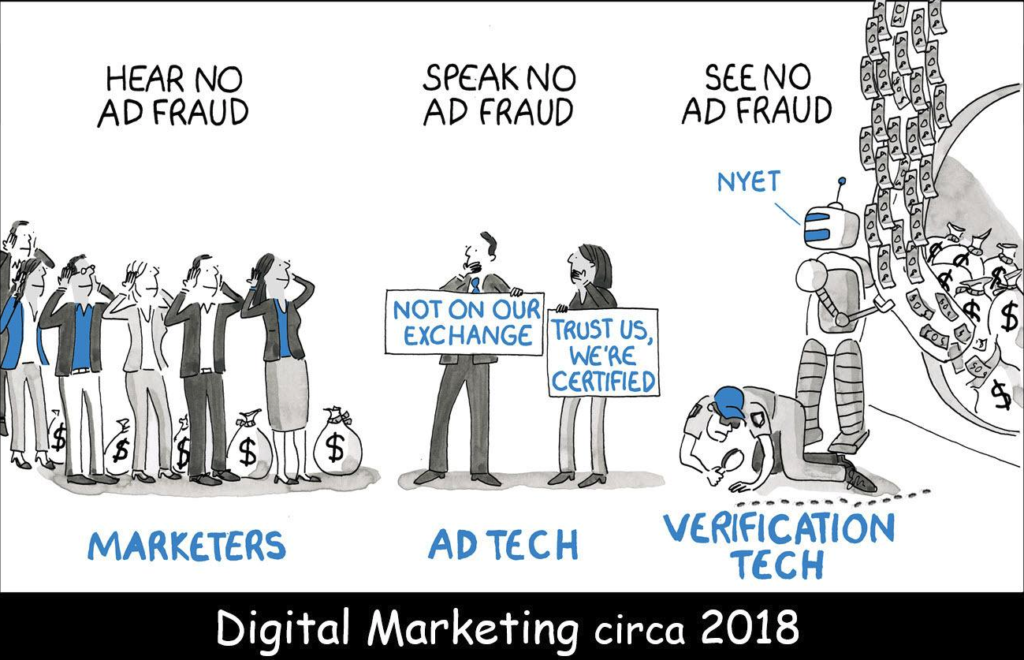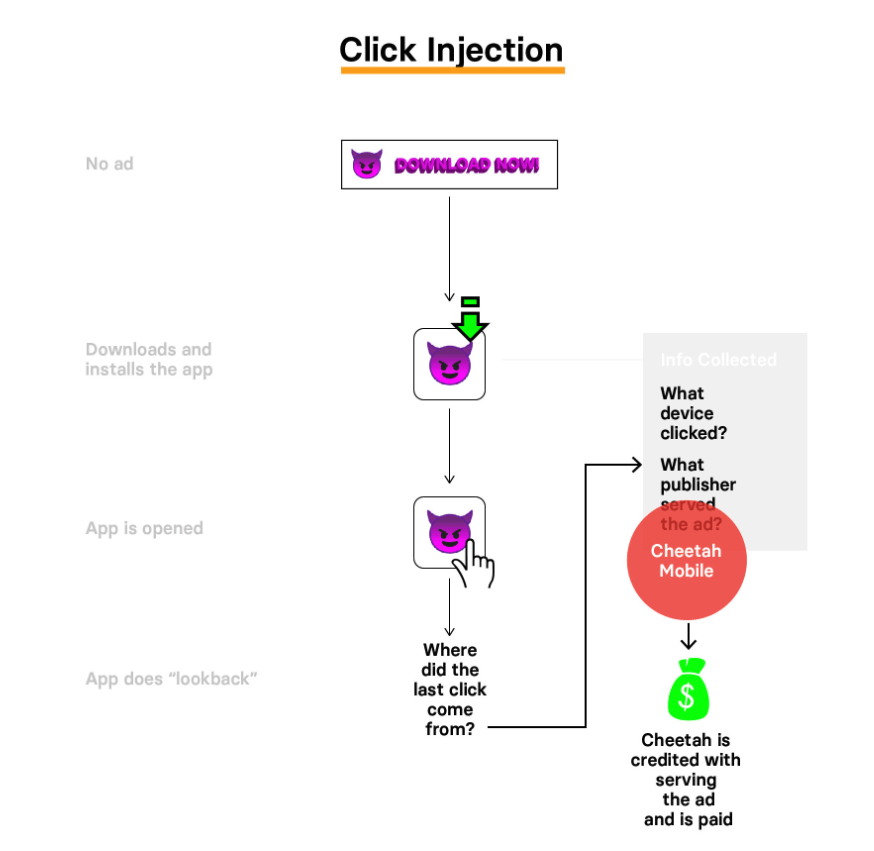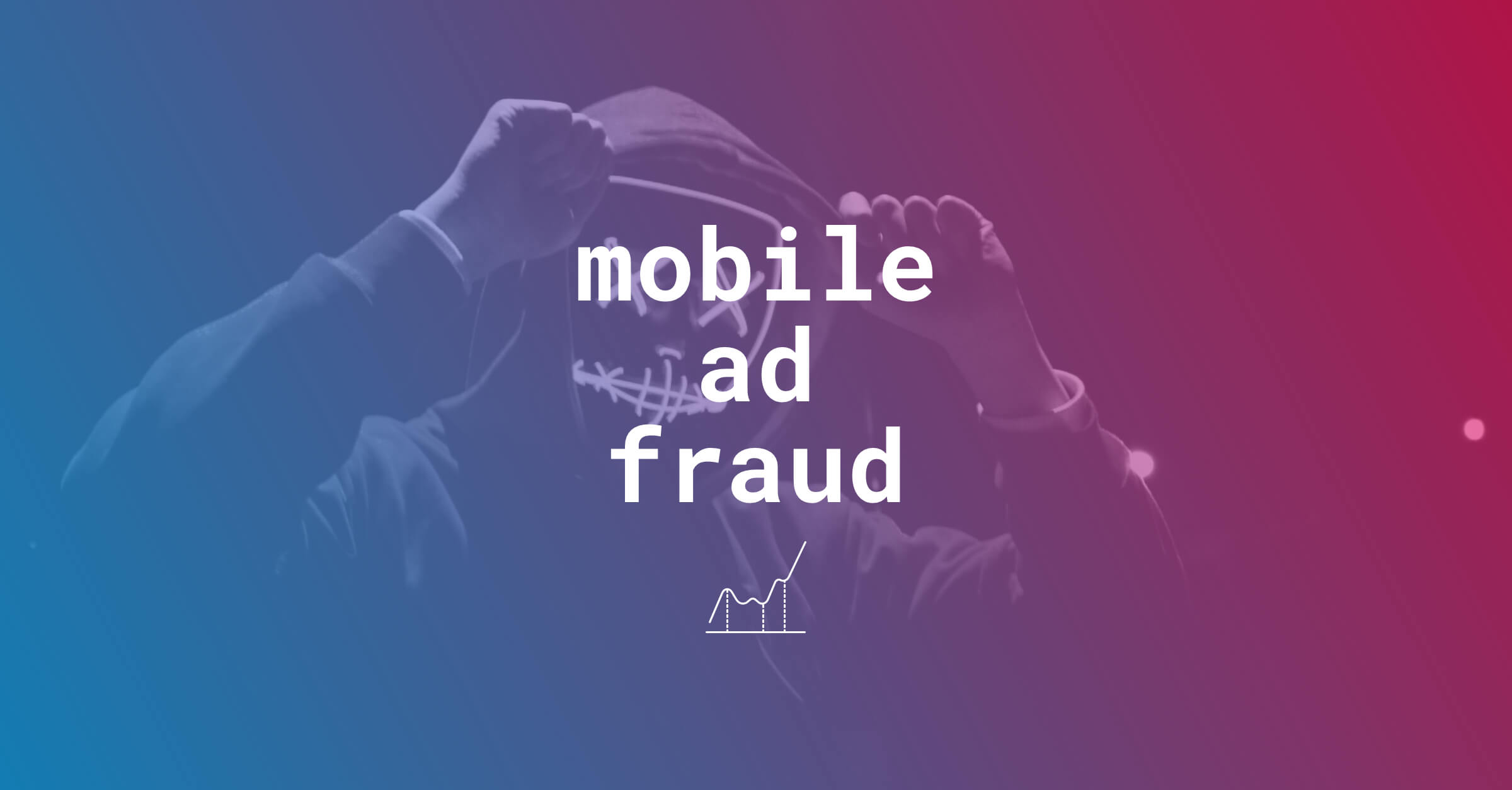
Author: Linda Harnisch
– Communications Lead
As app technology advances, so are ways of cheating the system and wasting advertisers campaign budgets on fake app installs. According to Adjust, the rate of fake app-installs, clicks, attributions and other mobile scams doubled in the past year alone. Mobile ad fraud has gained steam over the last years harming the mobile marketing ecosystem at a pace and scope that should be alarming for the whole industry.

Source: LinkedIn profile Dr. Augustine Fou
Recent investigations into install attribution abuse
Usually fraud is this vague idea in our heads about dubious scammers and never really associated with a specific company. This just dramatically changed in recent weeks (December 2018). A very recent incident on a relatively new and sophisticated way of install fraud has evolved around software company Cheetah Mobile. An investigation by BuzzFeed News and data from Kochava led to the accusation of mobile ad fraud by claiming credit for app installs. According to analytics by Kochava, seven of Cheetah’s and one of Kika Tech’s apps were accused of the following:
Cheetah and Kika apps tracked when users downloaded new apps and used this data to inappropriately claim credit for having caused the download. The practice being executed by Cheetah and Kika is referred to as click flooding and click injection, and ensures these companies are rewarded an app-install bounty even when they played no role in an app’s installation.
Google has already taken action and removed several of Cheetah’s and Kika Tech’s apps. Due to Google’s ongoing investigation into the topic they even discovered app install attribution abuse in three ad network SDKs in these apps. This was shared on in a blog post on 7 December 2018.
Update: In January 2019 another utility app with more than ten Million Downloads was caught doing shady stuff. See the article TCL Communications’ weather app has been creepily harvesting data
While there are several major types of fraud, a relatively new and sophisticated way of CPI fraud are click injections. How does it work? Well, just imagine a malicious app like a flashlight or keyboard app detecting when another app is about to be installed and triggers a click just before the install. Android apps can access a feature called broadcast intents letting them know when other apps are installed on a device. The incident around Cheetah Mobile has caused a stir since rarely has an analytics company such as Kochava ever accused a former client in a very public (and marketing effective) way. These days the story is a very prominent eye-catcher on the Kochava website.

Turning a blind eye on fraud
There doesn’t seem to be a remedy to stop fraud from taking your app marketing budgets. Coalitions like Adjust’s CAAF help bring awareness to the matter. In order to start resolving the damage it helps to become aware of the psychology and the motivation that lies behind all the different mechanism of fraud. To some extent, all the different actors in the mobile advertising chain are either directly profiting from ad fraud or at least tolerate it to not harm their business directly or indirectly. The motivation and temptation of turning a blind eye vary significantly.
Advertisers – Marketing Manager and Marketing Department
Marketers are not without their own responsibilities considering ad fraud is costing them money, business and reputation. According to the 2015 Bot baseline report by the US Association of National Advertisers only 17% of advertisers feel it was the advertiser’s responsibility to combat fraud. Advertising is a competitive field. Any given marketing manager running those ad campaigns is usually measured by the amount of installs / users they generate for the business. Often quantity is incentivized over quality and thus making managers and departments prone to turning a blind eye on fraud.
Reporting figures are usually never questioned, as long as they look good. Oftentimes the job performance rating of the marketing manager is directly tied to the campaign performance. Filtering out fraudulent traffic means less attributed users meaning weaker job performance for them. The same applies to the entire marketing department as a whole in the very end. If they would rigorously filter out any fraudulent traffic, their overall figures would decrease vastly raising the question, whether marketing is actually needed after all.
Publishers
Obviously the motivation for publishers behind fraud schemes is to make a quick buck. The market available for fraudsters is huge, lucrative and growing. According to a recent report from AppAnnie, mobile will account for 62 percent of global digital ad spend in 2019 (155 billion$). That’s up from 50 percent in 2017. Furthermore, 60 percent more mobile apps will monetize through in-app ads in 2019. Shady publishers are happy to charge advertisers for fake impressions instead of pitching in to solve this massive threat.
Ad-Networks
Ad-networks aggregate publishers. They are actually responsible for vetting each of the publisher partners before selling their traffic to advertisers and agencies alike. Certainly they have to take accountability in the fraud game getting a defined percent of the ad spend. If they actively throw out fraudulent publishers, their overall CPI (cost per install) would increase because the real installs will always be more expensive. Eventually advertisers would switch to a “cheaper” competitor and the revenue of the “clean” ad-networks diminish. Hence, networks lack incentives to be proactive in eliminating fraud from their processes.
Agencies
Why do we see media buying agencies turn a blind eye if not encourage fraud? Similar to the ad-networks, the revenue of the agency is based on a percentage of the ad spend. Cutting fraudulent traffic means less revenue and more expensive traffic. The damage of eliminating fraud harms agencies’ business interests, hence they have an incentive to overlook fraud to keep up the illusion of big numbers.
What is your stance on mobile ad fraud? Have you been affected or are you just starting to familiarize yourself with the issue? If you are ready to tackle mobile ad fraud or just want general support on the matter, drop us a line via email [email protected].
Helpful links:
BuzzFeed News article on Cheetah Mobile
Cheetah Mobile Further Responds to Recent Articles Regarding App Installation Attribution
Cheetah Mobile Responds to Kochava’s Misleading Statements







